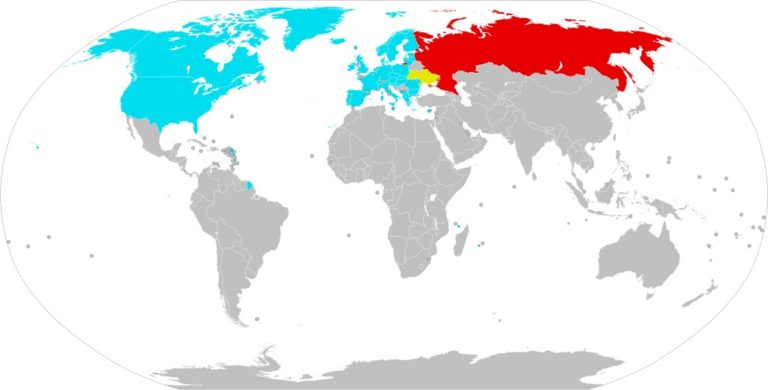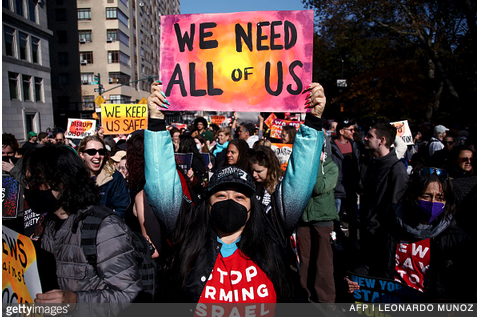by Jason Carson Wilson for Fellowship of Reconciliation (FOR)
Russian President Vladimir Putin’s thirst for power has brought death and destruction to his country and Ukraine’s innocent citizens alike. Russian sons head to war with neighbors, while civilians at home stand up to true tyranny–risking life and limb to gain independence from Russia.
Some argue that supporting a no-fly zone would help stop the bloodshed. It’s something that Ukrainian President Volodymyr Zelenskyy has repeatedly requested, including during a March 16 address to the U.S. Congress.
But it is frankly naive to consider a no-fly zone a peaceful way out. A no-fly zone is, obviously, a geographic area that certain aircraft can’t enter to attack, transport resources, or conduct surveillance, and the zone is managed by external armed forces. Shooting down banned aircraft – an act of military aggression – is an accepted method of enforcing a no-fly zone.
It would only create chaos leading to World War III. The danger of entertaining a no-fly zone is understandable. However, the argument that the United States – which has approved hundreds of millions of dollars worth of armaments and military aid to Ukraine, and is also selling billions of dollars worth of military equipment to Poland, arguably to replace what that nation has given Ukraine – isn’t actively participating in the conflict, leaves me confused.
Nevertheless, Putin’s concerns about Russia’s safety are lies that ring hollow as more shelling is the response to sanctions. Repossessing Ukraine – by any means necessary – is Putin’s aim.
“We are not going to impose anything on anyone by force,” he said when announcing the military action. Watching police carry Russian protesters off to an unknown fate tells a different story. Bombing a maternity hospital pushes another narrative. Hospitals are where lives begin and are saved.
Watching Putin’s unprovoked attack on Ukraine unfold and our country’s reluctance to support a no-fly zone forces me to confront the juxtaposition between self-defense and nonviolence. Some people might see helping defend Ukraine as a rejection of nonviolent philosophy. Our own government has forced us to struggle with this dilemma.
This debate has been taken up in many of our social movements. At the founding conference of the Student Nonviolent Coordinating Committee (SNCC) in 1960, Black civil rights activist Charles McDew argued, “You cannot make a moral appeal in the midst of an amoral society,” rejecting the nonviolent philosophy that was being proposed.
Making a moral argument to Putin, as he goes about the business of colonizing and killing innocents, is a fool’s errand. Hopes of finding common ground seem nearly impossible. Having faith that internal Russian resistance becomes his downfall is what appears to be the only option.
This faith leader doesn’t want to co-sign military action and warfare. But if diplomacy fails, it is a struggle to consider the remaining options for effective solidarity with the besieged Ukrainian people. “Somehow this madness must cease. We must stop now. I speak as a child of God and brother to the suffering poor of Vietnam. I speak for those whose land is being laid waste, whose homes are being destroyed, whose culture is being subverted,” the Rev. Dr. Martin Luther King, Jr. said during his 1967 “Beyond Vietnam” sermon at New York City’s Riverside Church.
The dynamics of this conflict and Vietnam are totally different – but a similarity exists. Dr. King is clearly not stating or implying that violence is a proper defense. I lift up his words because a thirst for power and domination – with a side of ego – fueled the Vietnam War.
Putin’s thirst for power and domination of Ukraine likewise fuels this unfolding tragedy. His ego pushes him to win by any means necessary. So, we’re at a crossroads. As in the anti-colonial struggles in Africa, Asia, and Latin America from decades past, we are now experiencing another moment when a targeted population is taking up arms to fight for self-determination and the prospect of lasting peace. The concept of “fighting for peace” may be an oxymoron to people who aren’t victims of White supremacy. But oppressed peoples have nearly always been required to fight for peace.
There are countless ways that liberation is attained, and the process of fighting for peace features many nonviolent tactics and strategies, but occasionally it also includes taking up arms in self-defense. The subjects of occupation and oppression all-too-often are forced to make a desperate choice between their principles and their life. Survivors of war only get two rewards when wars end: Preservation and relative peace.
Survivors of color barely get those consolation prizes. Black people exercising their rights–peacefully – still brought violence from White people. Marching through Selma and sitting at lunch counters sparked violence. Yet, they remain in a quasi-Cold War of their own against White supremacy.
Amoral people continually refuse to hear moral arguments. Let’s be clear. White supremacy isn’t strictly a United States export. Don’t forget that European colonizers imported it to create our nation.
Even amid Russian oppression, Ukraine has dehumanized and demoralized African people in its midst. Africans fleeing the war alongside other refugees have been removed from trains and continually sent to the back of lines. A viral video shows an African refugee seeking shelter from a White mob in a Ukraine police department. Police promptly released him to the mob. Whether these are common practices is unknown.
Everyone deserves peace and dignity – not just White “middle class” victims of war.
While this writer has spent a lifetime committed to practicing nonviolent social change and the politics of peaceful resistance, in this moment he struggles with the impression that confronting Putin seems to be the only way to give true peace a chance.
Checking a German dictator was the only path to peace and stopping more bloodshed. In a 21st century in which strong man dictators have risen worldwide alongside extremist nationalist ideologies and hyper-partisan political forces, is power more valued than humanity?
Ultimately, we must ponder the sobering reality that peace has a price. The relative peace for Black Americans, for which Dr. King fought, had an incalculable price. A grief-stricken Coretta Scott King on LIFE’s cover is only one of many receipts.
This faith leader prays fervently for a peaceful end to this unprovoked attack. And alongside our prayers, we must multitask: We must work for peace at home, in Ukraine, and throughout the world. Peace be with you.
Rev. Jason Carson Wilson is founding executive director of the Bayard Rustin Liberation Initiative. An ordained United Church of Christ minister, Wilson served as Justice & Policy Fellow at the UCC’s Justice & Witness Ministries office in Washington DC. He is a Fellowship of Reconciliation member and works with FOR-USA as a grassroots organizing support consultant, and also serves as the Bayard Rustin Fellow at the Community Renewal Society


